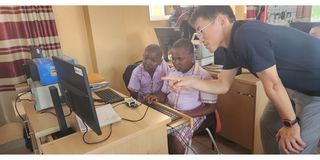Japanese experts partner with Veta to teach microcomputer programming

What you need to know:
The training, held from November 11 to 15, involved 240 participants, including students from Veta and nearby primary and secondary schools
Dar es Salaam. Japanese computer experts have collaborated with the Vocational Education and Training Authority (Veta) at the Kipawa Center in Dar es Salaam, to teach students basic programming and robot control using microcomputers.
The rapid pace of technological advancements and the increasing integration of robotics in various fields underscore the need for students to acquire programming skills.
Speaking to The Citizen on Friday, November 16, senior vocational tutor at Veta, Mr Martin Choma, explained that the programme utilises "IchigoJam," a Japanese microcomputer that features a simple microchip and an easy-to-learn programming language.
“The approach makes coding enjoyable, allowing students to develop games, control robots, solve problems and boost creativity,” he said.
The training, held from November 11 to 15, involved 240 participants, including students from Veta and nearby primary and secondary schools.
The programme aimed to provide hands-on coding experience, foster innovation and enhance learning opportunities.
“We partnered with Japanese experts to leverage their advanced expertise in computer technologies. Besides training our students at the centre, we also invited students from neighbouring schools to learn programming,” he said.
He noted that the Japanese experts donated over 50 microcomputers to Veta to support the initiative and train future trainers.
Chief executive officer of ICT4.e Company Ltd, Mr Hidekazu Hara, shared his inspiration for the programme.
“I came to Tanzania in 2022 as a volunteer at Veta Mtwara, where I identified the need for students to learn programming using simple technologies to keep pace with global advancements,” he said.
Mr Hara emphasised the significance of programming education, noting that many students are unaware that devices such as projectors, air conditioners and cameras contain computers.
“By promoting programming education, students can learn to control these devices and even install robot programmes to enhance their functionality,” he explained.
After returning to Japan, Mr Hara sought to continue supporting programming education in Tanzania.
“Through crowdfunding with 70 Japanese donors, I raised funds to acquire microcomputers, which were then donated to Veta to facilitate ongoing training,” he said.





